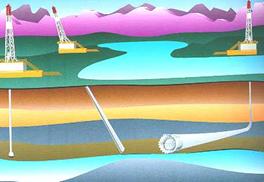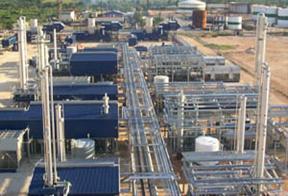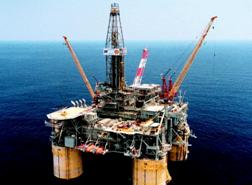- Israel lays claim to huge offshore gas reserves, but
could this field extend into Lebanon's Exclusive Economic Zone (EEZ) and
could Lebanon succumb to the same treatment as the people of Gaza? This
year Israel had some very promising news from the American company drilling
in its offshore waters. Noble Energy announced a significant natural gas
discovery in its Tamar prospect situated in the Matan license, offshore
Israel. The Tamar #1 well, is located in approximately 5,500 feet of water
and consists of three high-quality reservoirs.
-
- The project is a US-Israel consortium consisting of Delek
Drilling (15.6%), Avner Oil Exploration (15.6), Isramco Negev 2 (28.7),
Dor Gas Exploration (4%) and the US drilling company Noble Energy Inc (36%)
.
-
- According to Noble Energy's CEO. "The thickness
and quality of the reservoirs encountered were greater than anticipated
at the well location. This is one of the most significant prospects that
we have ever tested and appears to be the largest discovery in the company's
history." Needless to say that Israel is delighted with this latest
find, as it could be the start of their independence in Natural Gas
-
- Further tests are still being carried out and if the
Tamar find proves correct, this will secure half of Israel's gas requirements
for the next 20 years. One can only assume that Israel would still require
the balance to come from the Gaza field or elsewhere. According to the
report this will reduce the dependency on imported oil/coal from such places
as Mexico, Norway and Russia.
-
- Israel has made a long term commitment to convert to
natural gas and therefore urgently needs to explore for more reserves in
order to secure its energy future.
- Previously the Israeli Petroleum Commissioner calculated
that Israel had some
- 35 trillion Cubic Feet of proven gas reserves in
offshore Gaza, which they stated was enough to supply Israel's current
electricity network for 25 years. Israel's latest find in Tamar could amount
to the same volume or possibly much more.
-
- Despite Israel's vast offshore area most of their activities
happens to be at both extremities of their zone. In the North we see them
drilling almost on the border with Lebanon and in the South we see them
drilling on the border with Gaza. I have seen this scenario in many other
regions of the world whereby a company drills close to international borders
in order to stake their claim. In some cases concerns have been raised
that such techniques are not only considered to be intimidating, but also
has the potential to drill under such borders and exploit someone else's
oil or gas reserves.
- I can recall such claims being made on the Kuwait-Iraq
border and in the Timor Sea on the Australian-Indonesian border.
-
-

-
-
-
- With this uncertainty in mind we now have a situation
developing that could cause similar concerns to both the Lebanese Government
and the local authorities in Gaza. The Tamar field in the North could possible
stagger the border with Lebanon and, should this be the case, then internationally
speaking the reserves would be jointly owned. In the South we have exactly
the same situation between the Gaza Marine Area and adjacent Israeli waters.
This uncertainty is totally unacceptable and should never be allowed to
develop. Oil and gas exploration companies and their respective contracted
governments should always look for more diplomatic ways of carrying out
such exploration projects, especially in such politically sensitive areas.
It could be considered both intimidating and most undiplomatic if such
activities take place without consultation with the adjacent country.
-
- To give an example we can look at the situation developing
further South. At the moment the Israelis are pumping gas from their Mari-B
well to onshore Israel. This gas field sits right on the Gaza border and
one could ask the same question, does the Mari-B field extend into Gaza?
To the West of this commercial gas field are other explored reserves known
as Noa and Noa South. In the case of the latter two these reserves do stagger
the border with Gaza and therefore should be considered as jointly owned.
-
- Let's now consider the intention of Israel to bring the
Noa and Noa South wells into commercial production. The companies involved
can create a subsea connection between the existing Mari-B system to the
above wells and the entire gas reserves would then flow directly to onshore
Israel without any involvement or knowledge of the authorities in Gaza/Palestine
who legally jointly own them!
-
-
-

-
-
-
- Lebanon may well end up with this same scenario, if the
gas field does extend into their territory. Both sides would have to decide
how to allocate such reserves as it would not be commercially viable to
duplicate plants and pipelines for pumping gas to their respective markets.
It is also important to remember that, despite the differences between
the two countries, it is to their own economic advantage to joint venture.
Natural gas is perfect for running all the power stations (after converting
them to run on industrial gas turbines) and has the potential to run desalination
plants that normally require huge amounts of energy.
-
-
-

-
-
-
- Natural gas can run all public transport systems, all
major industrial complexes and provide domestic gas for every household.
Any surplus gas can be converted to Liquefied Natural Gas (LNG) for export.
This would not only bring high tech facilities to Lebanon and Gaza but
would also create many jobs. In the case of Gaza and the West Bank, local
gas would bring independence from Israel, which supplies all their electricity.
The Palestinians had already planned to use their offshore gas at three
new power stations they intended to build, but it is obvious that Israel
would never allow them to pipe their own resources directly into onshore
Gaza.
-
-
-

-
-

-
-
-
-
- The current offshore situation in the Eastern Mediterranean
offers unimaginable potential for the discovery and production of oil and
gas for the entire region. I would even be bold enough to say that the
region could hold prolific amounts of both oil and gas. The seabed contains
extremely thick salt encrusted layers that stem back to the time when the
Mediterranean Sea dried up. It is perfectly logical that under these dense
thick layers of salt and beyond the gas reserves are vast reserves of oil.
The question would be are drilling companies prepared to spend much more
time and money and drill deeper?
-
- The region is a hot bed of activity, geologically speaking,
with rifts and fault lines extending in many directions. What is interesting
about the East Med region is that once you have located such oil and gas
reserves they have a natural ability to recharge themselves time and time
again as a result of the geological activity going on below.
-
- The problem in the South (Gaza) has truly been allowed
to get out of control under the watchful eye of the United Nations, which
has been very critical of Israel. Israel blatantly ignores the UN and is
also in violation of the Oslo Accord by the exploitation of Palestine's
natural resources and the allocated fishing limits. We could see these
same problems occurring on the Israeli-Lebanon border with potential conflict
between the two countries which at best is already strained.
-
- In order to resolve these issues we have to ask the question
how can we address the many problems that exist? Firstly the governments
of Lebanon, Gaza and West Bank could unite in a common goal both politically
and legally, as they both share the same problems. Lebanon has a distinct
advantage over Gaza, who no longer has the infrastructure to deal with
such legal issues, especially when they are alienated from the rest of
the world.
-
- If the legal fraternity in Lebanon offered help to the
people of Gaza and the West Bank, they could all sit down together and
find a way of taking Israel to The United Nations Convention on the Law
of the Sea (UNCLOS) and the International Court of Justice. This action
alone would finally clarify international borders and challenge the legal
ownership of any disputed oil and gas reserves and at the same time help
Gaza recover its lost fishing zone that is so vital to its people.
-
- It is imperative that both Lebanon and Palestine in their
own right participate in current and future oil and gas exploration programmes
by carrying out Joint Ventures (JV) with international drilling companies.
These JV should show the owners of such potential reserves as being the
majority share holder, which was not the case in Gaza.
-
-
- Such actions should be taken without delay in order to
challenge the Israeli claim and to ascertain if in fact the Tamar gas field
does extend over the border. Should Lebanon prove this to be the case,
then legally both countries share in its ownership. With today's drilling
technology it is extremely easy for a drilling company on the Israeli side
to take oil/gas from adjacent waters by using slant/diagonal drilling techniques.
The map below gives some idea of the respective locations of the Tamar
Gas Field on the border with Lebanon and the Noa Gas Field to the West
of the Mari-B Gas Field which does stagger the border with Gaza. I must
draw an emphasis to the fact that this
map shows bias towards Israel and does not show any of these fields
extending into Gazan waters-when in actual fact they do.
-
-
-
- Peter Eyre is a Middle East Consultant living in the
UK.
|




